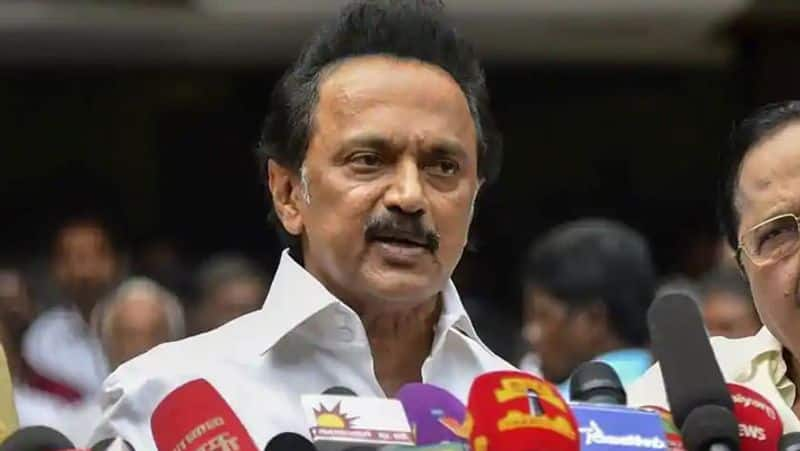Stalin has also not given up on some of the contentious and avoidable practices from the days of his dad. He also harbours a strong anti-Hindu sentiment and is also not above launching personal attacks on opponents.
The coming general election is a double test for the DMK.
One is obviously about the party doing well in the polls. The second is on its president MK Stalin. This will be the first major election that the DMK is facing since the death of its iconic leader M Karunanidhi.
When it comes to elections, Karunanidhi had two qualities. He had the knack of cobbling up long-lasting alliances. And on occasions when the party lost, he had the skill to keep the folk united and motivated. Among his major achievements cited was his equanimity and poise when his party was without power between 1976 and 1989, as the charisma and popularity of MGR (MG Ramachandran) totally eclipsed the DMK for 13 long years.
After that the DMK and the AIADMK had been alternating in power till 2016, when J Jayalalithaa bucked the anti-incumbency trend and retained power spectacularly.
Also read — Who gets DMDK: NDA, UPA or mahagathbandhan?
But much water has flowed under the bridge in Tamil Nadu since then, and the political landscape today is totally different in the state.
Both Jayalalithaa and Karunanidhi are gone, and there is a clear leadership crisis in the two major Dravidian parties.
But at least in the AIADMK, there was never really a succession plan and no leader was groomed to take on the mantle.
The case in the DMK is different. Stalin has been the heir apparent right from the late 1970s. Despite the internecine sibling war with the feckless MK Azhagiri, Stalin has been the anointed number two when Karunanidhi was around. Stalin was also the deputy chief minister in the last DMK government. Stalin was given enough space to cultivate his skills and become his own person in the long run.
Also read — South show: BJP now eyeing Andhra Pradesh, Kerala for alliances
All those carefully calibrated training does not seem to have paid much dividend, as Stalin's leadership skills are now under the microscope.
There have been enough voices within the DMK itself that are less than happy with his working style. "He doesn't have his dad's spark and inspirational streak," says a DMK functionary on the condition of anonymity as the party is known for its close-knit discipline and dissent is never aired publicly. "Kalaignar understood people better and his appeal reached the grassroots. Stalin, despite all the efforts, comes across as being standoffish."
It is not just in running the party inside that Stalin's approach has left something to be desired, even his electoral strategy is now being questioned. As of now, the DMK plan for the general election is (for the 40 seats in Tamil Nadu and Pondicherry): DMK 20, Congress 10, VCK 2, CPI(M) 2, CPI 2, MDMK 1, IJK 1, Muslim League 1 and Kongu party 1.
The DMK has given up half the seats, which clearly conveys that the party is not calling the shots in the alliance group, says M Prabhakar, a journalist in Trichy. "The one seat to Indiya Jananayaka Party (IJK) is a surprise and also quite revealing. It is not a political force at all and has no real strength. The party joined the alliance one day and walked out with a seat the next. It doesn't convey any sign of strength."
The thing that is most worrying from the DMK's perspective is that the party is one that has to be in the driver's seat going into the general election. There is a distinct discontent against the AIADMK in Tamil Nadu. It is an election that the DMK should, at least on paper, romp through. "But Stalin somehow comes across as being unsure and he himself doesn't seem to think he can win," says Mangayarkarasi, a professor of political sciences in Coimbatore.
Mangayarkarasi feels that Stalin, who spearheaded the DMK campaign in the 2016 state elections, seems to have been singed by the trauma of that loss. "It was an election that the DMK lost, rather than one that the AIADMK won. It is what is rankling him," she adds.
Stalin has also not given up on some of the contentious and avoidable practices from the days of his dad. He also harbours a strong anti-Hindu sentiment and is also not above launching personal attacks on opponents. The recent onslaught on Kamal Haasan after he took on the DMK leadership is a case in point.
Haasan has been implicitly suggesting that Stalin has no original ideas and seems to lead by rote formula. Stalin is also facing the charge that he is slowly promoting his son Udhayanidhi Stalin. Of course, this family politics is inevitable in the DMK.
Stalin's strength, on the other hand, is that he is a hard worker and always willing to put in the hard yards. He has toured the state and knows the issues of the people.
"But that alone does not suffice. He has to show leadership mettle. This election will show whether he has that or not," says Mangayarkarasi.
The views of the author are his own and may not reflect those of MyNation
Last Updated Aug 19, 2019, 4:39 PM IST











![Salman Khan sets stage on fire for Anant Ambani, Radhika Merchant pre-wedding festivities [WATCH] ATG](https://static-ai.asianetnews.com/images/01hr1hh8y86gvb4kbqgnyhc0w0/whatsapp-image-2024-03-03-at-12-24-37-pm_100x60xt.jpg)
![Pregnant Deepika Padukone dances with Ranveer Singh at Anant Ambani, Radhika Merchant pre-wedding bash [WATCH] ATG](https://static-ai.asianetnews.com/images/01hr1ffyd3nzqzgm6ba0k87vr8/whatsapp-image-2024-03-03-at-11-45-35-am_100x60xt.jpg)



